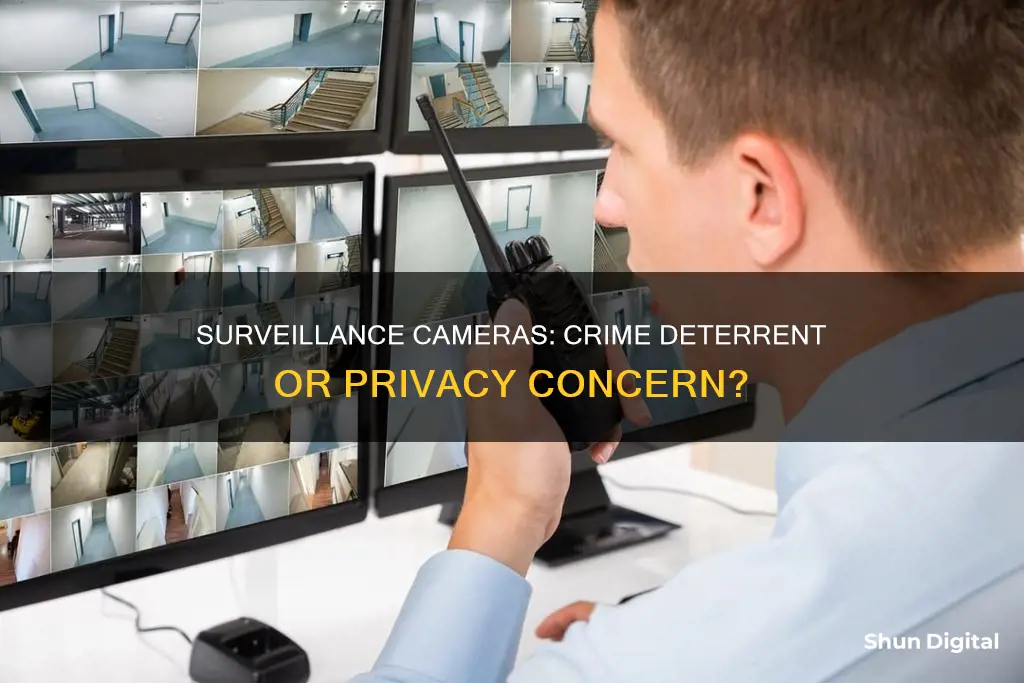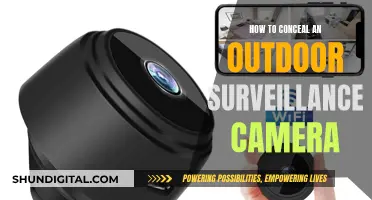
The use of surveillance cameras to deter crime is a highly debated topic. While some argue that they are an effective tool for crime prevention, others believe that their impact is limited and they may even encourage crime in certain situations. Surveillance cameras can be a valuable tool for monitoring and detecting crime, but their effectiveness in deterring criminal activity is uncertain. Studies have shown mixed results, with some indicating a significant reduction in crime rates and others suggesting that functioning cameras are necessary for any noticeable effect. The placement of cameras, the presence of additional security measures, and the type of crime all play a role in their success or failure as a deterrent.
| Characteristics | Values |
|---|---|
| Crime reduction | 50% or more |
| Effectiveness | Depends on placement, lighting, integration with other security measures |
| Cost-effectiveness | Affordable options available; potential to save on insurance |
| Privacy concerns | Cameras may be hackable; risk of footage being uploaded to the internet |
| Evidence collection | Helpful for police investigations and prosecution |
What You'll Learn
- Surveillance cameras are most effective when paired with other security measures such as alarms, lighting, and security guards
- Surveillance cameras are normalised in public spaces, but privacy concerns arise with private cameras
- Surveillance cameras are more effective in some locations than others, with the largest effects seen in car parks
- Surveillance cameras are more effective when actively monitored, but this raises concerns about cost and civil liberties
- Surveillance cameras do not deter all criminals and may be seen as an indication of valuables inside

Surveillance cameras are most effective when paired with other security measures such as alarms, lighting, and security guards
Surveillance cameras are a popular choice for security, and they can be very effective at deterring crime. However, they work best when used in conjunction with other security measures such as alarms, lighting, and security guards.
Surveillance Cameras with Alarms
Alarms are a passive security system, meaning they don't actively prevent crime but instead alert when a crime is taking place. Surveillance cameras with built-in alarms use motion detection sensors to trigger alarms when movement is detected. This not only deters criminals but also alerts you to any activity and provides crucial snapshots or videos of invaders.
Surveillance Cameras with Lighting
While surveillance cameras can be powerful tools, they often rely on proper lighting to capture clear images. Security lighting ensures that cameras can effectively monitor an area, especially in low-light conditions. LED lights are a popular choice as they produce a bright white light that illuminates objects and colours more clearly, aiding in the identification of suspicious persons and activities.
Surveillance Cameras with Security Guards
Video patrol security camera systems and onsite security guards are both considered active security types, meaning they can intervene to stop situations from escalating. Onsite security guards have the advantage of being able to react to suspicious activity immediately and can handle additional duties like access control and parking management. However, they may struggle to monitor large properties or handle multiple duties simultaneously, especially if they are alone.
Combining surveillance cameras with security guards can enhance the effectiveness of both. Remote video patrol systems allow security agents to monitor an entire property, both interior and exterior, and use tools like speakers and lighting to deter criminal activity. When used together, these measures can provide comprehensive security, utilising the strengths of each to overcome the weaknesses of the other.
Focusing on Self-Portraits: Camera Settings for Sharp Selfies
You may want to see also

Surveillance cameras are normalised in public spaces, but privacy concerns arise with private cameras
Surveillance cameras are commonplace in today's society, with their presence in public spaces becoming increasingly normalised. This normalisation can be attributed to the prevalence of surveillance cameras in public areas, leading to a general acceptance of this technology without much scrutiny from the public or media. The use of CCTV (closed-circuit television) has emerged as a popular crime prevention measure worldwide, with an estimated 49% of police departments in the United States utilising this technology.
While the presence of surveillance cameras in public spaces has become normalised, the use of private cameras in residential areas and neighbourhoods raises valid privacy concerns. Private cameras, such as those installed by homeowners or neighbourhood associations, can capture footage of individuals going about their daily lives, raising questions about the right to privacy and the potential for misuse of this footage.
The effectiveness of surveillance cameras in deterring crime has been the subject of much debate and research. On the one hand, studies have shown that the presence of security cameras can indeed deter criminals. For example, a local television station in Oregon interviewed 86 inmates serving time for burglary, and most of them stated that they would leave immediately if they saw security cameras on the property. Additionally, a comprehensive study by the University of North Carolina surveyed 422 burglars and found that half of them considered outdoor security cameras as effective deterrents.
However, it is important to note that the effectiveness of security cameras is not universal. Some studies have shown that security cameras do not always prevent crime, and in some cases, they may even be seen as an indication of valuable items inside a home. Additionally, the effectiveness of security cameras relies on proper functioning, and technical failures can sometimes prevent them from deterring crimes or capturing useful evidence.
To address privacy concerns, it is essential to strike a balance between public safety and individual privacy rights. This can be achieved through the implementation of regulations and guidelines that govern the use and placement of private cameras, ensuring that they are used responsibly and do not infringe on the privacy of individuals beyond what is necessary for crime prevention.
In conclusion, while surveillance cameras have become normalised in public spaces, the use of private cameras in residential areas warrants careful consideration of privacy concerns. The effectiveness of security cameras in deterring crime is evident in some cases, but it is not a guarantee, and their use should be complemented by other security measures to maximise their impact.
Yi Camera: Battery or Direct Power?
You may want to see also

Surveillance cameras are more effective in some locations than others, with the largest effects seen in car parks
The effectiveness of surveillance cameras in deterring crime varies across locations. While some studies suggest that security cameras can deter criminals, others indicate that they are only effective under certain conditions or in specific contexts. One such context is car parks, where surveillance cameras have been found to be highly effective in reducing crime.
The presence of surveillance cameras in car parks can result in a significant decrease in criminal incidents. In one study, the installation of CCTV cameras in a car park led to a 51% reduction in crime, making it the most effective setting for surveillance cameras among those analysed. This finding highlights the potential of surveillance cameras to enhance security and protect vehicles and individuals in car parks.
The effectiveness of surveillance cameras in car parks can be attributed to several factors. Firstly, car parks may be seen as more vulnerable locations by criminals, making them more likely to be targeted for theft or vandalism. By installing surveillance cameras, the risk of being caught increases, potentially discouraging criminal activity. Additionally, car parks often have clear lines of sight, allowing for optimal camera placement and coverage. This enables authorities to monitor the area effectively and quickly respond to any incidents.
Furthermore, the presence of surveillance cameras in car parks can provide a sense of security for individuals using the facility. Knowing that the area is under surveillance can reduce fear and create a sense of safety. This can be particularly important in isolated or poorly lit car parks, where the risk of criminal activity may be perceived as higher.
However, it is important to note that the effectiveness of surveillance cameras in car parks may vary depending on other factors such as lighting conditions, the placement of cameras, and the presence of additional security measures. Additionally, while surveillance cameras can deter some crimes, they may not prevent all types of criminal activity. For instance, crimes that are not within the camera's line of sight or that are planned and executed quickly may still occur despite the presence of surveillance.
In conclusion, while surveillance cameras can be a valuable tool in deterring crime, their effectiveness varies across locations, with car parks being one of the settings where they have been found to be most beneficial. The combination of increased security, optimal camera placement, and the sense of safety that surveillance cameras can provide in car parks contributes to their success in reducing criminal activity.
Materials Used to Make Camera Cases
You may want to see also

Surveillance cameras are more effective when actively monitored, but this raises concerns about cost and civil liberties
The presence of surveillance cameras is a divisive issue, with some people feeling more secure with them, while others feel nervous about being under constant surveillance. While there are valid concerns about cost and civil liberties, surveillance cameras are more effective when actively monitored.
Surveillance cameras can be an effective tool for deterring crime and improving public safety. In Orange County, New Jersey, the installation of surveillance cameras resulted in a 50% drop in all types of crimes. Similarly, the placement of 500 cameras in downtown Baltimore led to a significant reduction in crime by an average of 30 incidents per month. These cameras also helped prevent crimes from being committed, as individuals may be less likely to commit a crime for fear of being caught.
However, the effectiveness of surveillance cameras has been questioned. For example, in Lincoln, Nebraska, cameras placed in a downtown bar street did not help identify criminals or prevent crimes. Additionally, the high cost of implementing and maintaining surveillance cameras has been a point of contention. The American Civil Liberties Union in Michigan concluded that the limited results did not justify the high maintenance and personnel costs associated with public video surveillance.
Surveillance cameras also raise concerns about civil liberties and privacy invasion. With the advancement of technology, public surveillance cameras can now record and save biometric data such as facial and retinal scans, fingerprints, and voiceprints. This data can be used without people's knowledge and may be subject to abuse by law enforcement or other entities. The increasing use of mass surveillance has been particularly troubling for human rights advocates, as it poses a significant threat to the right to privacy.
Furthermore, public surveillance can create an environment of suspicion and fear, leading to self-censorship and a "chilling effect" on the exercise of basic rights, such as freedom of speech or peaceful protest. It can also perpetuate societal problems, such as discrimination, by feeding biased data into algorithms used by law enforcement.
While surveillance cameras can be beneficial for deterring crime and improving public safety, it is essential to carefully consider their potential drawbacks. The high costs, concerns about civil liberties, and privacy invasion associated with surveillance cameras should be addressed through legislation and proper regulations to ensure their responsible use.
Camera Focus: How to Spot and Fix Blurry Photos
You may want to see also

Surveillance cameras do not deter all criminals and may be seen as an indication of valuables inside
While security cameras are generally effective in deterring crime, they may not be a foolproof solution. Some criminals may view security cameras and alarms as an indication of valuables inside a home. This perception was observed in a study by KTVB7, where a few inmates out of 86 interviewees mentioned that they interpret security alarms and cameras as a sign of a wealthy target.
However, the same study also found that most inmates would leave immediately if they encountered security cameras or alarms on a property. This suggests that while some criminals may be emboldened by the presence of security measures, the majority would be deterred.
In support of this, a comprehensive study by the University of North Carolina surveyed 422 burglars and found that half of them considered outdoor security cameras as effective deterrents. This indicates that while security cameras may not deter all criminals, they can still be an effective measure against a significant portion of potential offenders.
Furthermore, surveillance cameras have been shown to aid in the investigation and prosecution of crimes. In Orange County, New Jersey, surveillance cameras contributed to a 50% drop in all types of crime. The police noted that access to surveillance recordings made it much easier to investigate and successfully prosecute offenders.
Additionally, the placement of security cameras can play a crucial factor in their effectiveness. It is recommended to keep outdoor cameras visible to deter potential burglars actively. This approach is supported by multiple studies, which found that burglars are less likely to target homes with visible security cameras.
In conclusion, while it is true that surveillance cameras may not deter all criminals and could potentially indicate valuables inside, their overall impact on crime reduction is positive. The benefits of security cameras extend beyond deterrence, as they also assist in crime investigation and prosecution. Proper placement and the combination of cameras with other security measures can further enhance their effectiveness in deterring criminals.
Moto Mod Camera Benefits: Enhancing Your Photography Experience
You may want to see also







